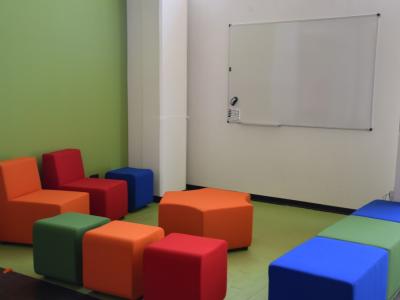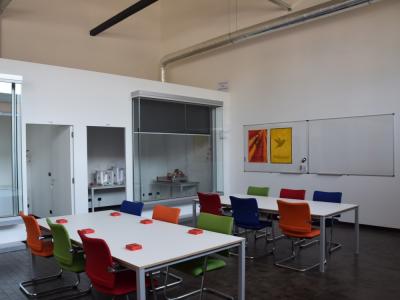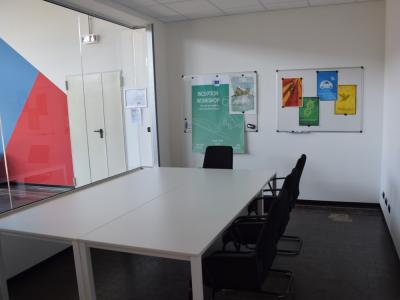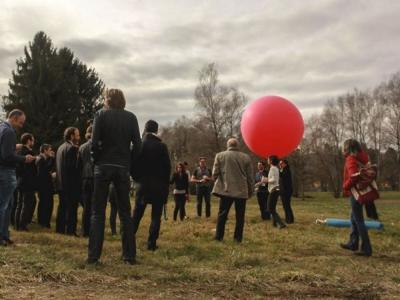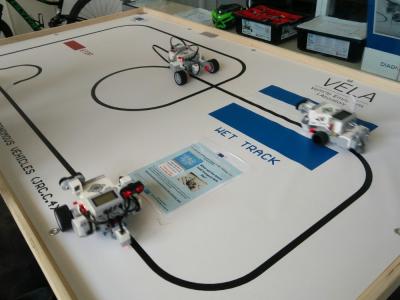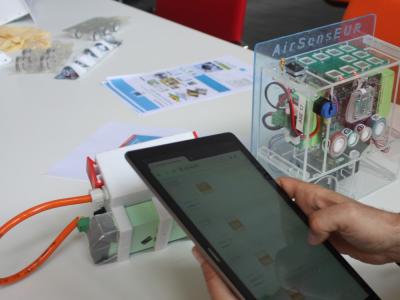JRC Makerspace
JRC Makerspace
The JRC Makerspace, the first of its kind in an EU institution, is a physical space located at the Joint Research Centre's Ispra site designed to promote active participation, knowledge sharing, and collaboration among different actors. In particular, the JRC makerspace aims to:
- be an incubator for multiple collaborations between Commission services (including JRC) and new transdisciplinary projects,
- involve different communities, or possibly
- setting for a reflexive re-examination of existing projects under diverse and emerging methodologies and theoretical frameworks.
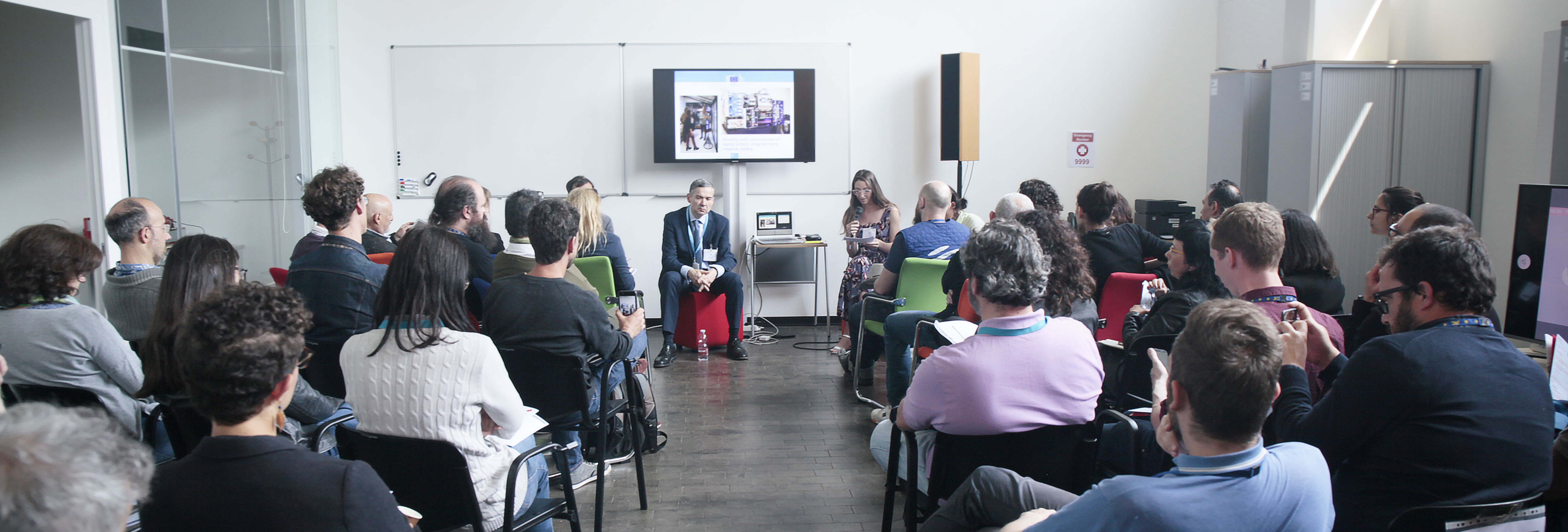
What is a Makerspace?
A makerspace is a community-orientated space with a philosophy of sharing and a spirit of craftsmanship. Makerspaces are often valued for fostering new forms of collaboration and education in STE(A)M related fields but also as spaces that foster grassroots involvement in societal matters. The Makerspace concept was developed out of a do-it-yourself (DIY) culture and, as a result, a strong hands-on approach is always present. Learning emerges as the consequence of in person engagement.
Makerspaces are commonly equipped with a set of tools and fabrication equipment - such as electronics equipment, 3D Printers, Laser Cutters, and CNC Milling Machines - that allow individuals to create, hack, and remake their “world” as they see appropriate. Therefore, makerspaces provide an active learning environment by giving individuals access to both the collaborative knowledge and know-how of the community behind each space (whilst fostering collaborative problem solving) and the necessary tools and equipment to transform their ideas into reality.
Makerspaces, complementarily, can be used to explore more open and creative forms of engagement and issue framing. They can be employed for collective and collaborative experimentation, where critical deliberation about techno-scientific innovation are explored through material approaches that incorporate the crafts, skills and creativity of those being engaged, as well as privileges the material and experience of the issues that are being tackled - e.g. if we talk about health, we can use the actual objects (materiality) of that proposal such as wearable sensors, apps and other relevant objects that interest our discussions. The outcomes that can materialize from makerspaces can be inspiring as they often offer new approaches for looking into (and tackling) the societal issues that concern us all.
Why a Makerspace at the JRC?
The JRC has long been experimenting with different formats of citizen engagement in techno-scientific innovations. The Maker Movement – a contemporary socio-cultural movement spurred by inventors, artisans, engineers, artists, researchers, and in general, people who love to invent, create and share their ideas – is a source of inspiration on how to engage citizens in technology and science, and how to tackle some of our pressing issues both from an economic and social perspective. The JRC Makerspace was conceived, in particular, to support ideas of societal deliberation, co-creation and citizen empowerment. It is a space to explore new methodologies of citizen engagement, as well as on recent phenomena like citizen science and DIY movements as more profound and care-oriented forms of societal participation in techno-scientific innovation processes. Equally important, it will be used to investigate how these loci of knowledge production relate to the policy realm. In this sense, the JRC Makerspace is a space for experimenting on two different levels simultaneously: first, it is a space to critically think and tinker responsibly with potential solutions for contemporary societal problems; and second, it is a space for exploring and testing different modes of collaboration and engagement.
The JRC Makerspace is part of a network of more than 800 Makerspaces in Europe, and is looking forward to not only connect with this growing community, but also to foster the space for more open and experimental approaches within the JRC and the EU policy processes.
What facilities does the JRC Makerspace have?
The JRC Makerspace was designed to be flexible and to foster collaboration and creativity. It can host 35 people at a time, accommodating a variety of activities from hands-on workshops and co-creation exercises, to seminars. The JRC Makerspace is organised in different areas and it has a variety of machinery and equipment.
Rooms
- Lounge area | Thinking Space
- Workshop area | Tinkering Space
- Meeting Room
- Video & Audio Lab
- Kitchen
- Equipment Room
Existing Machinery & Equipment
- 2x 3D Printers
- 1x Laser Cutter
- 1x CNC Desktop Milling Machine
- 1x Desktop Vinyl Cutter
- 1x 3D Scanner
- 1x Sewing Machine
- Electronics Equipment
- Assortment of Environmental Sensors
- Arduino® and Raspberry Pi® boards
- LEGO® Mindstorms robots
- LEGO kits
- littleBits® kits
- Balloon Aerial Mapping kit
- Video & Audio equipment
The JRC mobile Makerspace
To support the activities of the JRC Makerspace, a discarded air quality monitoring van was transformed into a multi-purpose mobile makerspace capable to accommodate a variety of public engagement initiatives in communities and schools outside of the JRC - It can be used, for instance, to engage citizens, in place, on building air quality sensors to collect environmental data whilst promoting conversation about better air quality in urban environments, or to stimulate conversations about smart cities and smart objects, including discussions about invasions of privacy, data and consumer protection, trust, accountability and security of systems, and loss of control. The JRC mobile Makerspace is set up with a variety of machinery and equipment, from a 3D printer and a CNC miling machine to electronics equipment and environmental sensors.
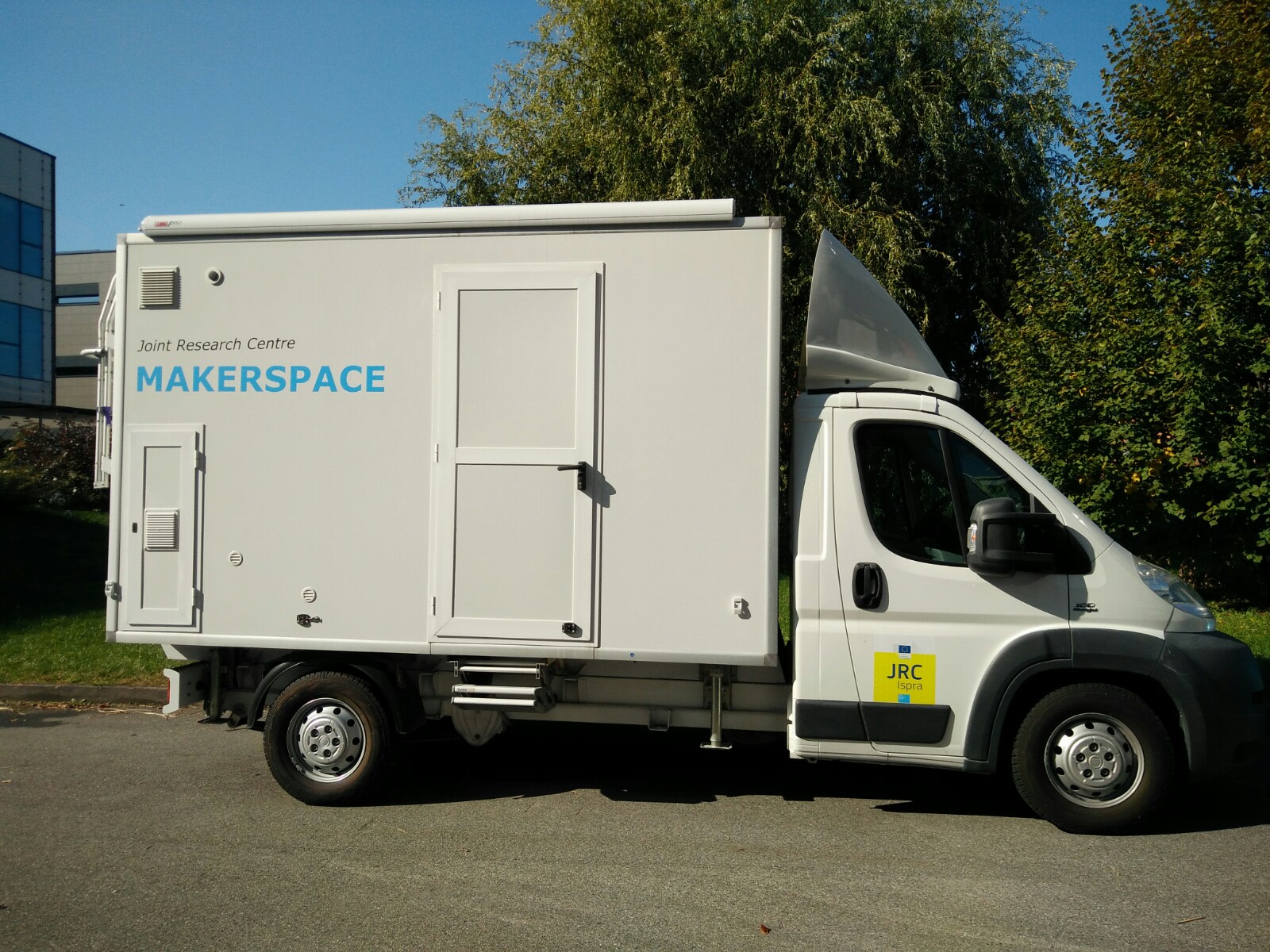
Who can use the Makerspace?
The JRC Makerspace is a multidisciplinary space freely accessible to JRC staff and to external actors under certain conditions - if you are not statutory staff from the JRC or other European Commission site, you are required to have a valid visitor’s daily permit for the JRC Ispra site and can only be in the makerspace during working hours, accompanied by the responsible of the makerspace.
One of the aims of the makerspace is to foster closer collaborations, not only between JRC staff from different units but also with external institutions interested in exploring particular issues at the intersection of society, science and technology. The makerspace can be used, for example, by any cross-cutting team preparing or developing a project or initiative. Teams are welcome to use and re-organise the space as they desire, in order to fit their needs.
The JRC Makerspace is also open to proposals from JRC staff for the organisation of workshops that can help develop STEAM-related skills, such as critical thinking, problem solving, creativity, innovation, communication and collaboration.
How can I book the JRC Makerspace?
The JRC Makerspace is open every day of the week and it can be booked for specific activities. If you would like to use the makerspace for an activity, please send the booking form duly compiled to jrc-makerspace@ec.europa.eu. Please make sure to indicate:
- Type of activity
- Coordinator
- Units involved
- Number of participants (maximum 35)
- Particular requirements
Bookings will be subject to confirmation by the team managing the makerspace. External requests need to be done at least 3 working days in advance and a copy of the visitor’s ID document is required.
Related documents
| Attachment | Size |
|---|---|
| Booking form | 121.31 KB |
